When the weather turns chilly, staying warm in your RV can be a challenge. But that’s no reason to shy away from traveling and camping in cool temperatures, even in winter. The trick is to understand your RV heating options and choose the best one(s) to beat the cold safely.
There are many types of RV heater options to choose from, but being able to power them wherever you’re traveling in the colder months is the key. So we’ve put together this guide to RV heat sources to help you stay warm in small spaces whether you’re winter camping in seriously cold weather or you just need to take the chill out of the rig on an unseasonably cool night.
- 1) What Are the Options for Heating an RV?
- 2) RV Furnace
- 3) CheapHeat Add-On
- 4) Diesel-Powered Hydronic Heat
- 5) Heat Pumps
- 6) Heat Strips
- 7) Portable Space Heaters
- 8) Gas/Diesel Forced Air Heaters
- 9) Electric Fireplace
- 10) Heated Floors
- 11) Head South 😉
- 12) Heating Options Video
- 13) RV Heating Options – Conclusion
- 14) Free RVing Tips, Tricks, Reviews & Giveaways
What Are the Options for Heating an RV?
First, we want to mention that no matter what heat source you choose to use in your RV, it’s important to consider that in very cold weather your heat source needs to not only keep YOU warm and comfortable in the RV but also protect your plumbing from freezing. 🥶
In many/most cases, just running your furnace (fueled by propane, diesel, or 120V AC) will ensure that heat is blown into appropriate areas under your RV. However, any other choice of interior heating will need to ensure that you’re not leaving your basement/plumbing exposed to the cold and at risk of freezing (which could result in serious damage from burst pipes and/or cracked fittings).
Let’s take a look at the various options for heating an RV, how each one may work best in particular situations, and the pros and cons associated with each option.
RV Furnace
Your main source of heat in an RV is likely to be the built-in furnace. Depending on how your RV furnace is powered, how you’re camping, and how long you need the furnace to run, you may need to supplement the heat it provides.
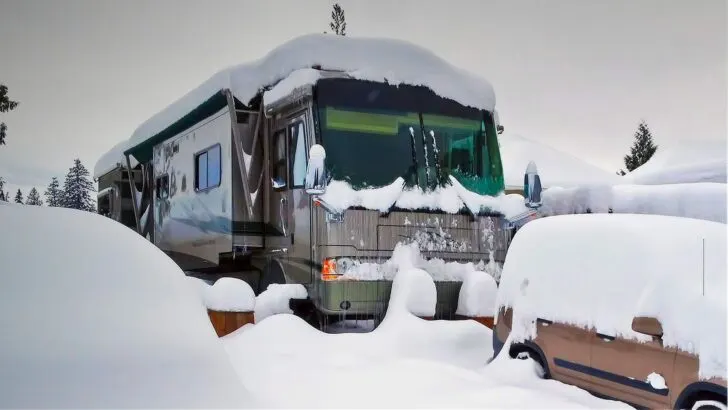
Depending on how cold the weather is where you’re camping, you may need to supplement your RV’s heating system.
An RV furnace is generally powered by a combination of fuel and electricity. Let’s take a look at the most common types of fuel used in RV furnaces.
Propane
Many RVs come with a single fuel source for the rig’s furnace and that fuel is propane. In our first motorhome, for example, we had two propane furnaces on board to keep us warm, but they burned through propane very quickly. This left us with a need to supplement that heat source at times (which we’ll talk more about in just a minute).
Let’s take a look at the pros & cons of this common source of RV heat:
Pros of a Propane RV Furnace
There are several benefits to propane furnaces on RVs.
- RV propane furnaces warm the interior of the RV quickly, no matter how cold it is outside.
- Because they run on propane, you don’t need to be connected to shore power to heat your rig.
- This type of furnace is already included with most RVs, so there’s no need to buy or install any other heat source.
- If your RV has a basement, your propane furnace usually routes heat down to that area to keep your RV plumbing warm and safe from damage.
- RV propane furnaces vent externally so they don’t contribute to the buildup of moisture and condensation inside the RV.
- If you have two RV propane furnaces on your rig, you can heat only one zone or both as needed.
- You can install an extend-a-stay onto your onboard propane tank to allow you to connect an external tank to provide an ongoing fuel supply that can be replenished without moving the RV.
Cons of a Propane RV Furnace
Here are the downsides of RV propane furnaces:
- RV propane furnaces use a lot of propane. For example, a single propane furnace can use more propane than your stove, oven, refrigerator, and barbecue grill combined. As regular boondockers, this was the primary reason why we rarely used ours. For more information on this, see our post on how much propane an RV furnace uses.
- They’re fairly noisy.
- The fans for an RV propane furnace run on 12V DC electric power. As always, you need to consider how that affects your power management when boondocking.
- If your RV only has a single furnace, using it requires heating the entire RV, whether you want to or not.
- If you run out of propane, you’ll have no way to heat your RV. Connecting to shore power or running your generator will not allow you to produce heat in your RV without adequate propane.
For additional information, see our post entitled, “How Does an RV Propane Furnace Work?”
CheapHeat Add-On
If you saw our post on converting an RV furnace to electric, you already know about this option. The CheapHeat system is essentially an add-on module that enables you to run your furnace like it was a big space heater, using AC power from the shore connection (or your generator) to heat your rig instead of propane.
If interested, you can see the installation of an Add-on Hybrid Electric Kit that allows the RV to switch back and forth between gas and electric as a heating source in this video:
This is an electrical heating option that works as an add-on assembly to an RV propane furnace, allowing you to choose between propane or electricity to heat your rig. However, they can cause power demand issues in certain situations because electricity is not easy to come by unless you’re connected to shore power or have plenty of fuel for your generator.
Pros of the CheapHeat Add-On
- The CheapHeat Add-On system is versatile. It allows you to choose between propane and electricity, depending on your camping situation.
- They’re reasonably easy to install.
- The system can be controlled from a distance via remote control.
- There are no low-temperature limits so they can be used successfully in very cold climates.
- The furnace blower tends to work less and the system is configurable.
- This system offers freeze protection to your plumbing because it provides heat to your basement and all pertinent areas of your RV (assuming your furnace ducting has an outlet where needed).
Cons of the CheapHeat Add-On
- The CheapHeat system isn’t great for boondockers, so if you mostly boondock (even in cold weather), installing the CheapHeat Add-On may not be worthwhile. You could use your generator to run the electric heat, but you’d still be burning fuel to do that.
- If you convert your RV furnace to electric, you’ll have to worry about exceeding your shore power capabilities. Otherwise, you may constantly be tripping the circuit breaker. This means when you’re running the furnace in electric mode, you may need to force your RV refrigerator and water heater to run on propane so you don’t pop the breaker at the pedestal.
Diesel-Powered Hydronic Heat
An RV hydronic heating system (like the Oasis or AquaHot) may or may not provide both heat and hot water. Either way, these systems are often diesel-powered (though there are also propane-powered models) and use your RV’s large onboard fuel tank.
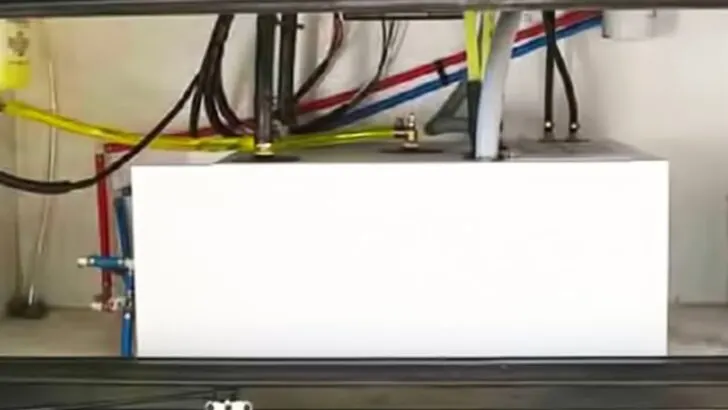
A hydronic heating system installed in the basement of an RV.
It’s also important to note that diesel fuel offers the highest amount of energy per volume, so a gallon of diesel offers more heat to keep you warm than a gallon of propane.
Most RVers who have experienced hydronic heat systems say that they would never want to be without it again. Here are some of the reasons why hydronic heat systems are desirable in an RV.
Pros of Diesel-Powered Hydronic Heat
- A diesel hydronic heating system has a large fuel supply from which to draw.
- Some models can run off the engine (while driving) or electricity (when on shore power or running the generator).
- Hydronic heat systems are quiet (they use smaller fans to distribute the heat) and efficient (diesel is a highly efficient source of BTUs).
- Multiple zones allow control of which parts of the rig get heated.
- Hydronic heating systems put out an even, comfortable heat.
- If so equipped, they can also provide unlimited hot water.
- Hydronic heating systems allow for RVs to be all-electric, getting rid of the need for propane.
- Optional engine and basement heat can preheat the engine in cold weather and protect basement plumbing from freezing temperatures.
Cons of Diesel-Powered Hydronic Heat
- Hydronic heating systems are very expensive.
- The systems are quite complex and may require more maintenance and repairs.
- The fans and pump use 12V electric power which is something frequent boondockers need to consider.
- There is some potential for diesel fumes outside the RV, although this seems to be less of an issue in newer units.
- A system failure would take out both your heat and hot water.
- Hydronic heating systems are not available on all types of RVs and are generally only found in more expensive rigs.
Heat Pumps
When we bought our Newmar Mountain Aire in 2005, the addition of combination heat pump air conditioners was a big plus for us. Our previous RV (a 2002 Fleetwood Bounder Diesel) didn’t have them, so the onboard furnace was our only option for heat on that RV.
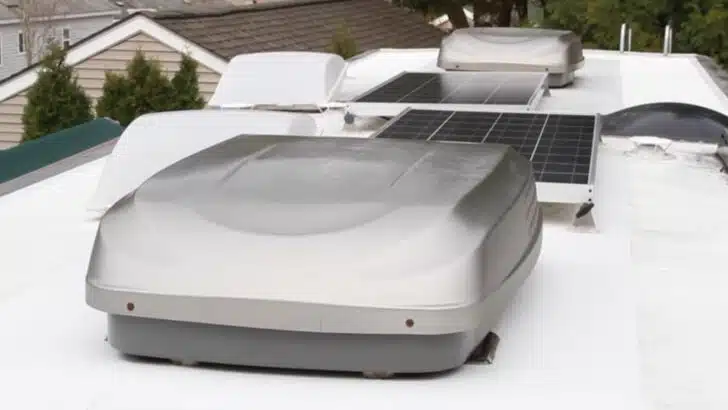
Two heat pumps make for some multi-zone heating, but they’re not ideal for boondockers like us because they require a fair amount of power.
Heat pump air conditioners run in a reversed cycle to blow heat into the RV, supplying heat and cool air depending on your needs. However, they require sufficient power to run, and their power needs may be too great for most boondockers. Additionally, if you’re connected to 30A shore power or less, you may need to be careful about any other power usage (switch your RV fridge and water heater to run on propane to eliminate their electric demand).
Another issue is that a heat pump will have an outside ambient (low) temperature limit and won’t work below about 40-45°F (4-7°C). So while they can be a great option for removing some chill from the air on cooler days, they aren’t able to keep you warm in bitter cold.
This is why, depending on the temperature and whether we’re connected to shore power or not, we make different heat choices.
Pros of Heat Pumps
- Heat pumps run on 120V AC electricity, the cost of which is usually covered by the campground fee.
- They don’t contribute moisture to the interior air, helping to avoid condensation inside the RV, which is always a concern (but especially in the winter).
- If you have two or more heat pumps you can control each zone independently.
- You can power your heat pumps with your generator if necessary.
Cons of Heat Pumps
- Heat pumps are fairly power-hungry. You’ll need a 30A hook-up to run one heat pump and a 50A hook-up to run two or more of them at once.
- If you’re staying in a long-term site at an RV park, electricity is usually billed separately… so using your heat pumps will increase your electric bill.
- Heat pumps are not great for boondocking because you need to run your generator to power them (or have a LARGE battery bank and solar array).
- Heat pumps won’t work when the outside temperature drops to around 40°F or lower. So, heat pumps are not useful in very cold climates.
- Since they’re mounted to the roof, heat pumps can be noisy (just like roof-mounted air conditioners).
- If you have only one heat pump, you’ll need to heat the entire RV whether you want to or not. You can’t simply heat a bedroom, for example.
- Because they aren’t connected to your RV furnace’s ducting, heat pumps won’t heat the RV’s basement, and can’t protect your waterlines from freezing.
Heat Strips
Heat strips are similar to heat pumps, but instead of running the air conditioner in a reverse cooling cycle, a small 120V AC heating element is built into the air conditioning unit. These are installable aftermarket and serve to provide some amount of heat through electricity. They do, however, have power demand issues depending on the draw of the heat strip.
The pros/cons are almost identical to those of heat pumps, above. But, because they don’t rely on the exchange of heat with the outside air, they don’t have the low temperature limit and can be run even when outside temperatures are below 40°F.
Portable Space Heaters
Space heaters are very popular with RVers. But there are several different types of space heaters. Which type works best for you will depend on the type of RV you have and how you typically camp.
Electric Space Heaters
Electric space heaters can be helpful in an RV under certain circumstances. In our first motorhome, we bought an electric space heater to supplement our RV furnaces. We knew that we could run the electric space heater when connected to shore power and save on the propane required to run our two RV furnaces.
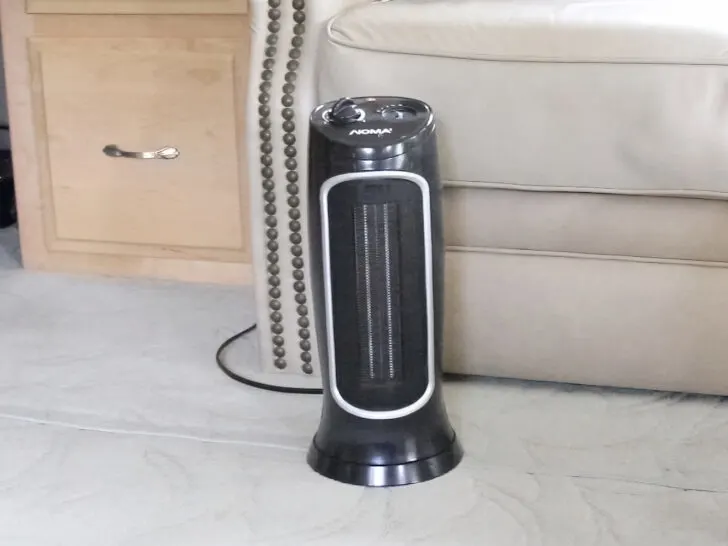
An electric space heater can be a great way to heat just the area(s) you need to.
The problem with electric space heaters for RVers is that they demand 120V AC electric power, so you need to be connected to short power to be able to use them. If you’re boondocking, you won’t be able to run an electric space heater for long periods.
Another issue with electric space heaters is the safety concern based on their ability to tip over and cause a fire, especially in an RV occupied by children or pets.
Also, if there’s a power failure, it’s possible that your electric space heater may not reset to the “On” setting, leaving your rig without sufficient heat. This could be a problem if you were away from the RV and weren’t able to turn it back on.
Here are the pros and cons of electric space heaters at a glance:
Pros of Electric Space Heaters
- They allow you to heat an RV without propane.
- They provide focused heat, keeping you warm where you happen to be, instead of heating the entire interior of the RV.
- There’s often no additional ongoing cost to running them if you’re connected to shore power at a paid campground or RV site (though some parks do charge extra for electricity use).
- They’re inexpensive, small, and easy to store.
- They contribute any moisture to the interior air, helping to keep the potential for condensation down.
- There are many shapes, sizes, and models available… and they’re available at many retail locations.
- They’re usually fairly quiet when operating.
- Easy to transfer between an RV and a home or another location.
Cons of Electric Space Heaters
- Using an electric space heater means there’s extra gear to buy and store.
- They’re not very powerful as a rule, and they won’t heat a large area of the RV. This may mean that you need to use more than one electric space heater at a time, so you’ll need a 30A or 50A shore power connection to do so.
- They require 110V AC electricity, so they’re not very useful for boondocking unless the generator is running.
- You need to keep flammable items away from electric space heaters and use caution not to tip them over due to the risk of fire.
- Electric space heaters will not provide hot air to the basement of your RV, therefore your waterlines and the rest of your plumbing system may be at risk unless another source is providing heat to that location.
Some examples of popular electric space heater options for RVs are:
Pelonis Electric Oil Filled Radiator
This particular type of oil-filled radiant heater is a good way to heat a larger space in an RV, for example.
- [Efficient Heating & Adjustable thermostat] Featuring 3 heat settings (600, 900 and 1500 watts) corresponding LOW, MID and HIGH options with a...
- [Portability] Equipped with 4 heavy duty universal casters and front carry handle provides easy portability to move your Pelonis space heater from...
Delonghi Convective Heater
This heater is the closest we can find to a current version of the convective heater we showed in our video below, but (full disclosure) we used one for a while and when it worked, it worked very well. It provided consistent heat throughout the living area of the RV, and didn’t have the ups-and-downs people often complain about with other heating options.
However, we ended up throwing it out because it broke in a relatively short amount of time, so we don’t recommend it anymore. As always, your mileage may vary.
- Room Heater - Fast, Efficient heat packs 1500 watts of power best for medium to large rooms. Best space heater for bedroom or any room in your home.
- Versatile Style - Offers maximum performance, combining functionality and design and offers both floor and wall mount options with included kit. Feet...
Propane Space Heaters
A vent-free propane heater has been one of our favorite ways to keep warm in our RV, but it is also one of the most controversial options for heating an RV (for more on this, see our post addressing the question, “Can you use a propane heater indoors?“).
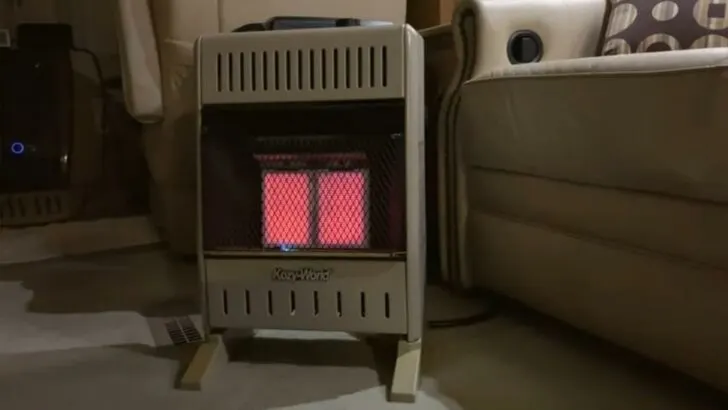
Our Kozy World vent-free propane heater has kept us toasty warm on many cold days & nights.
There are various types of portable ceramic, blue flame, and catalytic heaters. We used one made by Kozy World and it worked great for us. But many people will tell you that portable propane heaters are extremely dangerous when used indoors and are not a good idea at all. Others, like us, will tell you from experience that these portable heaters work great.
But just like every other heat source, there are both pros & cons to portable propane heaters.
Pros of Propane Portable Heaters
- The heat output is excellent and can heat the interior of an RV quickly and very effectively
- They’re fuel-efficient, barely sipping propane.
- Their operation is silent.
- They use no electric power at all.
- They work well in boondocking situations (and are very popular among desert boondockers).
Cons of Propane Portable Heaters
- Again, a portable propane heater is extra gear to buy and store.
- Because it uses propane, it requires extreme caution due to the potential fire hazard. You also need to keep flammable items away from the heater and ensure that it doesn’t tip over (again, pets and kids may be an issue).
- We did the job ourselves, but in general, portable propane heaters need to be installed by professionals to connect them to your onboard propane tank. Otherwise, you need to choose a model that uses replaceable propane canisters and store extra canisters on board, replacing them as necessary.
- Portable propane heaters generate moisture as a byproduct of combustion, which can add to the potential for condensation. Additional ventilation is required, which can be counter-intuitive… you usually want to keep the cold outside air OUTSIDE.
- They use oxygen, so they require adequate ventilation to protect against the potential for suffocating (most newer models include onboard oxygen depletion sensors and will shut off if oxygen levels begin to drop)
- Working carbon monoxide detectors and propane detectors are necessary anywhere a portable propane heater is being used (all RVs should have functioning detectors anyway.)
- Extreme caution needs to be exercised if there are children or pets in the RV due to the potential fire hazard. If you have children or pets on board, you’ll want to choose a model that has tip-over protection that works well.
Within the category of portable propane heaters, there are options you can choose from:
- Exposed Flame Heaters: An example of an exposed flame portable propane heater would be the Kozy World heater we had on our RV, or the Mr. Heater Big Buddy or Lil Buddy heaters. These units generate a lot of focused heat with little propane usage, though they do create humidity issues due to combustion byproducts, so a fresh air source is necessary. There are “blue flame” models, where there’s literally a burner and blue flame like on your gas stovetop… and there are “radiant” models that use the flame to heat a porous ceramic block (like our Kozy World), which then glows red and adds infrared heating to warm surfaces faster.
- Catalytic Heaters: A catalytic propane heater uses a chemical reaction between propane gas and a catalyst inside the sealed heat chamber that generates heat without combustion. For this reason, there’s no issue from humidity and combustion byproducts, however, you still need to ensure a good source of fresh air for oxygen depletion.
Here are several good options for portable propane heaters:
Mr. Heater Vent Free 18,000 BTU Radiant Propane Heater
This one is the closest to our Kozy World radiant heater:
- Take the chill out of any room or space, inside or out up to 700 square feet; Easily mount to a wall or secure to the floor with the included legs and...
- Powered with reliable liquid propane with an output of up to 18,000 BTUs per hour; Completely safe operation indoors or outdoors with the automatic...
Mr. Heater Big Buddy 18,000 BTU
- 4,000- to 18,000-BTU radiant heater for spaces up to 450 square feet. Approved for indoor/outdoor use; clean-burning; nearly 100-percent efficient
- When operating the heater at altitudes over 7,000 FT above sea level the heater may shut off. Maximum Hours Of Operation- 220.0
Mr. Heater Buddy 4,000-9,000 BTU
- PORTABLE HEATER: Portable propane heater designed for emergency heat, tents, campers, job sites, porches, decks, garages, tailgates, barns, sheds, ice...
- HEAT SPACE: Perfect for heating enclosed spaces up to 225 square feet
For information on the Little Buddy, see our post on small propane heaters.
Camco Olympian Wave6 Catalytic Heater
This is the 6,000 BTU model. There is also a 3,000 BTU model available (Wave3) as well as an 8,000 BTU model (Wave8), so you can choose how much heat you think you’ll need.
- No flame, flue or chimney
- No electrical drain or battery connection make it the ideal solution for boon docking and dry camping
If you’re using any propane-powered heat source (including your onboard propane furnace), you may want to add the ability to use an external propane tank instead of the built-in, onboard tank. The Extend-a-Stay adapter we mentioned earlier in the post works for just this purpose and helps you to avoid having to move your motorhome or use a propane delivery service to refill your propane:
- Includes propane tee.Fit Type: Universal Fit
- Includes 5' auxiliary tank hose and 12' additional appliance hose
Gas/Diesel Forced Air Heaters
These heaters run off of your vehicle’s onboard tank of gas or diesel fuel. They’re fairly small, although they’re generally not portable and typically require professional (or very handy DIY) installation and need to be monitored for potential leaks.
The most well-known name/brand in this space would be Webasto. The Black Series HQ19 that we spent time on had a diesel-powered, Webasto-style forced air heater that did an incredible job keeping the space warm (sometimes TOO warm), even in freezing temperatures.
For more information, including their pros & cons, see our post on RV diesel heaters.
Electric Fireplace
An electric fireplace is becoming a more common factory-installed feature in RV living rooms. They often have a “simulated” fireplace look, and an optional space heater built in that can help take the chill out of the room. These aren’t effective for heating an entire RV, nor do they offer protection to the RV plumbing in your RV basement. But they DO add that cozy feeling on a cold, wintry day.
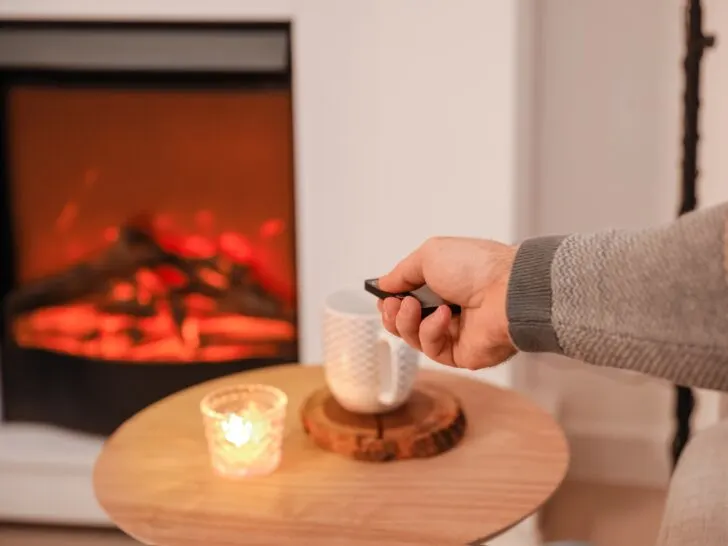
Electric fireplaces come with many comforts… like on-demand heat and a remote control!
Because they use 120V AC electricity to run, you’ll either need to be connected to shore power, run your generator, or have a large battery bank to power them. And, of course, when using them… proper power management techniques are needed.
Heated Floors
Heated floors are primarily designed to take the chill out of a hard floor made of tile or wood. The ambient and convective heating from a heated floor may be enough to keep the living space from feeling chilly on a cool morning but would be unlikely to be very helpful in extremely cold temperatures. They would not heat the living space of an RV nor would they protect the rig’s plumbing system.
Head South 😉
A tongue-in-cheek answer many RVers will give others about how THEY stay warm in their RV during the winter months is to get in their RV and head south to warmer weather. That isn’t an option for every RVer, of course. But if you have the ability to be anywhere for the winter, why not choose to pull up stakes and become a snowbird? Places like Florida, Texas, Arizona, Southern California, and even Mexico (and beyond) are calling!
Heating Options Video
A few years back, we made the following video to cover a lot of the above-mentioned heating options. Check it out:
RV Heating Options – Conclusion
As you can see, there are numerous options for heating an RV in chilly weather or even in the coldest winter temperatures. Note that if you plan to live in your RV in one location in the cold winter temperatures, you may want to consider RV skirting, including inflatable RV skirting.
Free RVing Tips, Tricks, Reviews & Giveaways
As 20-year full-timers, we share everything we’ve learned about RVing over the years. Join our online community to receive a wealth of great RVing knowledge delivered daily to your inbox.
Whether you’re a new RVer or a seasoned full-timer, you’ll love the wide range of RVing topics we cover. Don’t miss a single article or any of our famous Giveaways. Subscribe to our newsletter today!









Mike
Sunday 31st of March 2024
No mention of small air tight wood stove, seems to me this would be the most reasonable way to keep warm when boondocking and when properly installed.
Joseph
Monday 20th of April 2020
How much carbon dioxide is given off with the propane space heaters? If it is cold and you have to open a window to heat the RV it seems counter productive. Do you know anything about in floor heating strips? Thanks for the video.
TheRVgeeks
Monday 20th of April 2020
Hi Joseph! We don't have any quantifiable numbers about the amount of Carbon Dioxide the heater emits, but it isn't burning much more propane than a burner on a propane stovetop (which, if you read the manual, ALSO states that you should be sure adequate ventilation is available to avoid problems). It does seem counter-intuitive to open a window when you're trying to warm up the inside of your RV... but we haven't found it to be a problem. And since, in cold temps, you need to vent out the warm, moist air anyway (to avoid condensation forming on/in the walls, etc)... it's not really any different.
We're not familiar with the in-floor heating strips... other than knowing that, in the past, manufacturers have had some problems with them causing issues with flooring coming un-adhered (not a word, we know). Don't know if they've made progress with that or not... but it would be something we'd want to look into more before proceeding with a project like that.
Steve V
Sunday 24th of December 2017
I found this video very helpful and informative. I have a travel trailer with an enclosed insulated basement. So the only way for me to keep the tanks from freezing, as far as I know, is to run the propane furnace. I'm plugged into a 30 amp at a campsite and loving the space heater. It alone keeps the interior plenty warm. I just wish there was a way to circulate the warm air inside the trailer with the basement without having to set my LP furnace thermostat higher than the inside temperature. Is this really not possible? Of not, is there any modification I could do? I would think this is a common problem but I've found virtually nothing online.
TheRVgeeks
Sunday 24th of December 2017
Hi Seve! Thanks for the comment and great question. We have a pretty well insulated basement, and it sounds like you do, too. When we use auxiliary heating methods (such as electric space heaters) that don't send heat to the basement compartment, we put a 60-watt incandescent light bulb down there in a drop/trouble light. We also put the remote sending unit from our indoor/outdoor thermometer down there so that we can easily confirm the temperature down there without going outside. We mentioned that in a couple of videos, including our most recent ( https://www.thervgeeks.com/winter-rving/electrical-mod/ ) and in our original video about how we RV in the winter ( https://www.thervgeeks.com/winter-rving/how-to-rv-in-the-winter/ ), bit of which have some more useful information about cold weather RVing. Keep in mind that we were RVing in a somewhat moderate winter climate (BC's Lower Mainland) where the temps rarely get below the 20s. If we were in a much colder climate, with temps in the teens or single digits or below, we might need more than just a single 60-watt bulb to prevent plumbing from freezing in the basement. Hope this helps!
Ray and Susy
Saturday 23rd of December 2017
Really enjoyed the video, but the statement of (waking up dead) is an oxymoron. My wife and I are just getting ready to retire and Rv. Watch everything related to this. Keep up the good work.
TheRVgeeks
Saturday 23rd of December 2017
Thanks Ray & Susy! That “wake up dead” thing is a lyric from a (twisted) lullaby I learned when I was a kid. LOL
gmoney
Wednesday 20th of January 2016
That's the plan! Tks